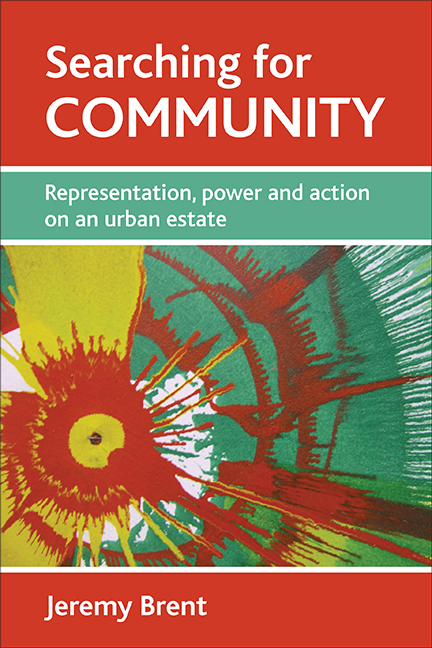Book contents
- Frontmatter
- Contents
- Foreword
- Notes on the author
- Introduction
- one Four settings: contexts and questions
- two Researching Southmead: problems of representation and participation
- three The intelligent outsider? Official and media representations of Southmead
- four Knowledge from within: community art and local representations
- five The outsider within: crossing worlds
- six Young people and community: trouble and tribes
- seven Four examples of community action in Southmead
- eight What is community anyway?
- nine Engaging with community
- ten Communicating what youth work achieves: the smile and the arch
- Author’s acknowledgements
- Epilogue: Southmead eight years on
- Afterword: Why Jeremy Brent’s work is more relevant than ever
- Bibliography
- Index
four - Knowledge from within: community art and local representations
Published online by Cambridge University Press: 22 January 2022
- Frontmatter
- Contents
- Foreword
- Notes on the author
- Introduction
- one Four settings: contexts and questions
- two Researching Southmead: problems of representation and participation
- three The intelligent outsider? Official and media representations of Southmead
- four Knowledge from within: community art and local representations
- five The outsider within: crossing worlds
- six Young people and community: trouble and tribes
- seven Four examples of community action in Southmead
- eight What is community anyway?
- nine Engaging with community
- ten Communicating what youth work achieves: the smile and the arch
- Author’s acknowledgements
- Epilogue: Southmead eight years on
- Afterword: Why Jeremy Brent’s work is more relevant than ever
- Bibliography
- Index
Summary
Introduction
The ‘insider’ views of Southmead that are examined in this chapter set themselves up as different to official and media representations. The insider approach is that these outsider representations are generated from a position similar to the master's standpoint as described by Sandra Harding:
The logic of the standpoint epistemologies depends on the understanding that the ‘master's position’ in any set of dominating social relations tends to produce distorted visions of the real regularities and underlying causal tendencies in social relations.
In place of this outside knowledge, the knowledge of subordinate, inside groups is privileged in terms of understanding. It is claimed as clearer and less distorted than the knowledge, gained through secondary experience, of those who occupy dominating positions in social life. That people within a situation know most about it is a widespread, if contestable, argument, common within Southmead. One of the participants wrote of the community play, which was based on local experience:
I have lived in Southmead all my life and I think this is an excellent chance to show people what Southmead is really made of.
‘Insider’ knowledge claims are based on a primary concrete experience of the situation, and it is this experience that provides their credibility.
Vincent Berdoulay, a French language geographer, writes that ‘our scientific understanding of it [place] cannot be artificially separated from people's account of their place’; in fact, ‘a place becomes explicitly into being in the discourse of its inhabitants’. This is a different argument from that in which Southmead is created as a social space through the discourse of social policy, and is an argument that sets out to challenge the supposedly neutral and rational knowledge that that discourse generates.
Looking at knowledge about Southmead that comes from Southmead involves a very different approach to that of certain strands of sociology that are summarised thus in a book on community: ‘The analysis of any problem in sociology cannot make people's opinions of that problem its point of departure’. Instead, it involves what Steve Pile and Nigel Thrift call a politics of location, ‘a politics that makes no claims to second guessing others’ experience, but still allows people to speak for themselves’. Writing about this politics of location is not, however, a simple process.
- Type
- Chapter
- Information
- Searching for CommunityRepresentation, Power and Action on an Urban Estate, pp. 97 - 126Publisher: Bristol University PressPrint publication year: 2009



